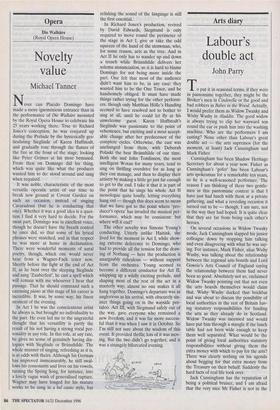Opera
Die Walkiire (Royal Opera House)
Novelty value
Michael Tanner
Never can Placido Domingo have made a more ignominious entrance than in the performance of Die Walkiire mounted by the Royal Opera House to celebrate his 25 years working there. True to Richard Jones's conception, he was conjured up during the Prelude by the hysterically ges- ticulating Sieglinde of Karen Huffstodt, and gradually rose through the flames of the fire at the front of the stage, looking like Peter Grimes at his most bemused. From then on Domingo did his thing, which was quite like what the producer wanted him to do: stood around and sang when required.
It was noble, characteristic of the most versatile operatic artist of our time to break new ground at Covent Garden on such an occasion, instead of singing Cavaradossi (but he is conducting that one). Whether it was a good idea is a ques- tion I find it very hard to decide. For the most part, Domingo was in excellent voice, though he doesn't have the breath control he once did, so that some of his lyrical phrases were snatched, and in that respect he was more at home in declamation. There were wonderful moments of aural poetry, though, which one would never hear from a Wagner-Fach tenor now. Shortly before the fight at the end of Act II, as he bent over the sleeping Sieglinde and sang `Zauberfese, he cast a spell which will remain with me whenever I hear that passage. That he should command such a caressing piano at this stage of his career is incredible. It was, by some way, his finest moment of the evening.
In Act I he was the conscientious artist he always is, but brought no individuality to the part. He even led me to the ungrateful thought that his versatility is partly the result of his not having a strong vocal per- sonality in any role. In this role, at any rate, he gives no sense of genuinely having dia- logues with Sieglinde or Briinnhilde. The whole manner of singing, refreshing as it is, is at odds with theirs. Although his German has improved immeasurably, he still swal- lows his consonants and lives on his vowels, turning the Spring Song, for instance, into a lovely vague wash of generalised rapture. Wagner may have longed for his mature works to be sung in a bel canto style, but relishing the sound of the language is still the first essential.
In Richard Jones's production, revived by David Edwards, Siegmund is only required to move round the perimeter of the stage in Act I, give or take the odd squeeze of the hand of the strawman, who, for some reason, acts as the tree. And in Act II he only has to wander up and down a trench while Briinnhilde delivers her solemn annunciation, so it is hard to blame Domingo for not being more inside the part. One felt that most of the audience didn't want him to be, in any case: they wanted him to be the One Tenor, and he handsomely obliged. It must have made things rather trying for the other perform- ers, though only Matthias H011e's Hunding seemed to have resolved not to bother to sing at all, until he could let fly at his unwelcome guest. Karen Huffstodt's Sieglinde was passionate to the point of vehemence, but exciting and a most accept- able change after her predecessor of the complete cycles. Otherwise, the cast was unchanged from them, with Deborah Polaski the best Briinnhilde of our time. Both she and John Tomlinson, the most intelligent Wotan for many years, tend to sing on thrilling overdrive for as long as they can manage, and then to display their artistry by making a little go just far enough to get to the end. I take it that it is part of the point that he sings his whole Act II monologue quite loudly, letting everything hang out — though this does seem to mean that we have got to the point where 'pro- ducer's opera' has invaded the musical per- formance, which may be consistent: but where will it end?
The other novelty was Simone Young's conducting. Utterly unlike Haitink, she lived for the moment in Act I, while show- ing extreme deference to Domingo, who had to provide all the tension for the draw- ing of Nothung — here the production is unarguably ridiculous — without support from the orchestra. Young seemed to become a different conductor for Act II, whipping up a wildly exciting prelude, and shaping most of the rest of the act in a masterly way; almost no one makes it all hang together. Domingo's departure was as unglorious as his arrival, with obscurely sin- ister things going on in the wayside por- taloo. Act III, with Siegmund safely out of the way, gave everyone who remained a new freedom, and it was far more success- ful than it was when I saw it in October. So I'm still not sure about the wisdom of this event. It provided thrills; lots of it was mov- ing. But the two didn't go together, and it was a strangely bifurcated evening.


















































































































 Previous page
Previous page